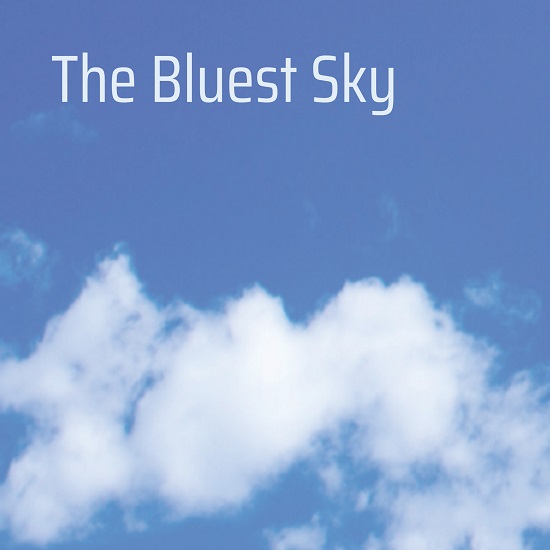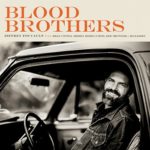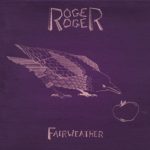
The Bluest Sky is the latest incarnation of Chuck Melchin, following his spell of four albums and two EPs as the cornerstone of celebrated Bean Pickers Union. The self-titled album is an attempt to move on from gentler introspective feel of his earlier work to creating “music that will make you want to drive your car faster”. With the nine songs featured here, he’s definitely succeeded; there’s only one slower, more contemplative, song on the album, but more about that later. The Laurel Canyon influence is strong on ‘The Bluest Sky’ with nods to Eagles, Neil Young and maybe even Evan Dando at times. The album was put together using the post-COVID method of musicians recording parts in their own studios before being mixed and mastered by Dave Westner; the results are organic and seamless.
The opening song, ‘Belly to the Bar’ sets the tone for the rest of the album with a country rock feel driven along by a pair of electric guitars under Melchin’s slightly fragile vocal as the story unfolds of a character trying to avoid being pulled into a rebound relationship. Most of the album’s songs are about personal situations although each has a slightly different twist. ‘The Girl It Took the Universe’ is a metaphysical look at the unseen forces moulding and pulling together two people over the aeons until the time is ripe for them to meet ending on a classic sixties sus4/sus2 progression, ‘Amy Jean’ is a straightforward karma and revenge song with a Southern rock feel that hints at the Allman Brothers’ Band’s ‘Jessica’ and ‘I Am James’ is a gentle country rock story of a man too shy to get himself noticed by a woman. ‘Drive Through Confessional’, with its mainly acoustic arrangement before a soaring electric guitar joins the mix, is a powerful piece of hometown nostalgia that turns around with the realisation that that reason for going back is the death of a loved one; it’s a powerful piece of work.
The two songs that step outside the personal may or may not be connected. The slow and melancholy ‘New Berlin’, its sadness punctuated by pedal steel fills, is a snapshot of a smalltown American town destroyed by a world economy that values only profit and scale; things can only get worse. There are a couple of references to classic American songwriters, John Fogerty’s ‘The Old Man Down the Road’ and Townes Van Zandt’s ‘Waiting Round to Die’ in the lyrics. It’s a powerful song with a storyline that could ultimately lead to the apocalyptic vision of ‘Bunkhouse’, the album’s penultimate song. The story of an unspecified rebellion and survival skills is played out over a Crazy Horse-style backing to maximum sinister effect.
Chuck Melchin and his collaborators have achieved the primary aim of making us want to drive faster while creating a bunch of varied and beautifully crafted songs. Job done.
‘The Bluest Sky’ is out now.
This is ‘Bunkhouse’:
 “Blood Brothers” has a very familiar sound; it’s the sound of 1970s Laurel Canyon. That’s not a criticism; the Canyon was a creative hub in the seventies California music scene and it’s no coincidence that Don Henley, a member of that scene covers Jeffrey Foucault’s songs in his live sets. The arrangements and stylings all have the feel of those classic Elektra/Asylum albums of the early 70s. Jeffrey Foucault also has a voice that’s straight out of that era with hints of Randy Meisner and Jackson Browne in there. And, like those albums, the musicianship is of the highest quality while being largely understated. No flash, just perfect settings that allow the ten songs to breathe and shine. And the whole thing was recorded directly to tape over three days in Pachyderm Studios in Minnesota.
“Blood Brothers” has a very familiar sound; it’s the sound of 1970s Laurel Canyon. That’s not a criticism; the Canyon was a creative hub in the seventies California music scene and it’s no coincidence that Don Henley, a member of that scene covers Jeffrey Foucault’s songs in his live sets. The arrangements and stylings all have the feel of those classic Elektra/Asylum albums of the early 70s. Jeffrey Foucault also has a voice that’s straight out of that era with hints of Randy Meisner and Jackson Browne in there. And, like those albums, the musicianship is of the highest quality while being largely understated. No flash, just perfect settings that allow the ten songs to breathe and shine. And the whole thing was recorded directly to tape over three days in Pachyderm Studios in Minnesota.
The opening song “Dishes” sets the tone for the album lyrically and musically. It’s gentle, laid-back and extols the virtues of domestic simplicity, whereas the second song, the apocalyptic, end-of-days “War on the Radio” is less typical. It has a country-rock feel with more of an emphasis on the rock, and is driven along by fiddle fills as we look into the abyss.
The rest of the album has the same DNA as “Dishes”, gentle arrangements pulling out the best in stories of domesticity in small-town America peopled with the characters that we can all relate to: the frustrated singer-songwriter in ”Cheap Suit” and the father looking back at his wedding day (with the album’s second reference to washing dishes) in “Little Warble”, with its clever lyrical device of ‘warble’ appearing at the start of the song in relation to the car’s tape player and at the end in relation to the singer’s heartbeat.
“Little Warble” has a country feel, while the rest of the album is Elektra/Asylum (you’d swear David Lindley was there) apart from the Neil Young-tinged “Blood Brothers” and “Rio” which is pure “Harvest Moon” with picked guitar, drums with brushes and pedal steel. If you’re a fan of the Eagles/Jackson Browne school of music, then you’re probably going to enjoy this album.
“Blood Brothers” is out now on Blueblade Records (BB-006).
 Roger Roger; just to clear up any confusion it’s not a call-sign, it’s Lucas and Madeleine Roger, two twins from Winnipeg and their debut album, “Fairweather” is co-produced by their father Lloyd Peterson. Glad we got that cleared up. Each of the siblings brings their individual flavour to the album and the songs are split almost evenly between them. Madeleine’s songs are in the classic introspective, story-telling style, while Lucas brings a guitar-slinging slacker feel to the album with his contributions. Each takes lead vocal on their own songs and adds harmonies as the final ingredient on their sibling’s songs; the final confection is very tasty indeed.
Roger Roger; just to clear up any confusion it’s not a call-sign, it’s Lucas and Madeleine Roger, two twins from Winnipeg and their debut album, “Fairweather” is co-produced by their father Lloyd Peterson. Glad we got that cleared up. Each of the siblings brings their individual flavour to the album and the songs are split almost evenly between them. Madeleine’s songs are in the classic introspective, story-telling style, while Lucas brings a guitar-slinging slacker feel to the album with his contributions. Each takes lead vocal on their own songs and adds harmonies as the final ingredient on their sibling’s songs; the final confection is very tasty indeed.
“Fairweather” is a very clean-sounding album that doesn’t need too many production tricks to enhance the nine songs or Lucas and Madeleine’s vocal and instrumental performances. The album as a whole evokes the seventies Laurel Canyon singer/songwriter era (and Madeleine can sound a lot like Joni Mitchell), but there are hints of later styles, particularly in “Another Girl’s Shoes” which has the melancholy feel of The Gin Blossoms or Matchbox Twenty. The biggest production on the album is “Mad Trapper”, which combines an early Eagles feel with an over-driven guitar riff, Hammond and some nice harmonies.
The album’s opener, “13 Crows” is the moving story of an old man’s reminiscences as he nears the end of his life, set against a chiming guitar riff that has more than a passing resemblance to the main theme from Beethoven’s Ninth. It’s catchy and thought-provoking, setting the tone for the rest of the album. The clean production and the two superb voices tie in the album’s disparate elements, such as the contrasting songwriting styles and arrangements, creating an album that’s mellifluous and intelligent.
If you want recommendations, the title song is a lovely, melancholy picture of a person whose life revolves around missing opportunities, while the closing song, “Scott Free” tells the tale of a woman in a doomed relationship with a bad boy. “Fairweather” is a lovely album packed with catchy melodies woven round stories of smalltown characters and misfits.
“Fairweather” is out in the UK on Friday October 7th.


